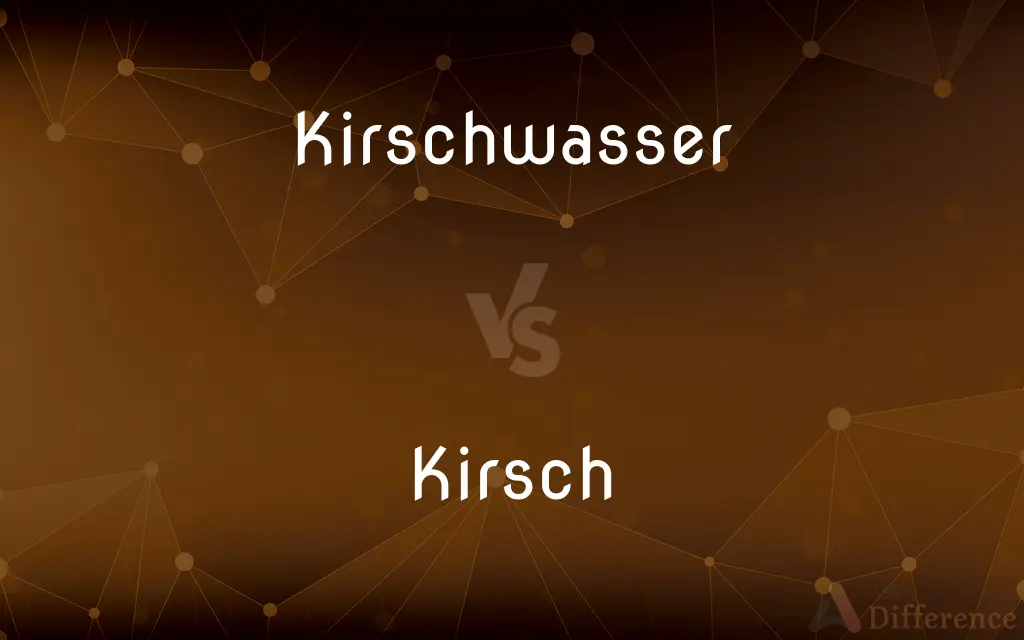Kirschwasser vs. Kirsch — What's the Difference?
Edited by Tayyaba Rehman — By Fiza Rafique — Updated on April 24, 2024
Kirschwasser, a clear brandy distilled from cherries, is typically higher in alcohol content, while Kirsch may refer to both Kirschwasser and other cherry-flavored liqueurs.

Difference Between Kirschwasser and Kirsch
Table of Contents
ADVERTISEMENT
Key Differences
Kirschwasser is a specific type of clear brandy made from the fermentation and distillation of cherry juice and pits, imparting a distinctive bitter-almond flavor due to the pits. On the other hand, Kirsch is a broader term that can be used to describe any cherry-flavored spirit, including Kirschwasser but also extending to sweeter, less alcoholic cherry liqueurs.
Kirschwasser is traditionally produced in Germany and parts of Switzerland, and is used extensively in cooking and as a digestif. Whereas, Kirsch might be produced in a variety of locations and can vary significantly in production methods and usage depending on the region.
In terms of alcohol content, Kirschwasser typically has an alcohol volume of 40% or more, making it quite potent. On the other hand, Kirsch, when referring to cherry liqueurs other than Kirschwasser, often has a lower alcohol content, making it milder and sweeter.
Kirschwasser is often enjoyed neat, sipped from a small glass, and is appreciated for its clear, refined cherry essence. Conversely, Kirsch, especially when not synonymous with Kirschwasser, is frequently used in cocktails or as a flavoring in desserts due to its sweeter and more pronounced cherry flavor.
Comparison Chart
Definition
A clear brandy made from cherries and cherry pits
A term for any cherry-flavored spirit
ADVERTISEMENT
Alcohol Content
Typically 40% or higher
Varies, generally lower than Kirschwasser
Flavor
Bitter-almond, subtle cherry
Sweeter, more pronounced cherry
Common Uses
Cooking, digestifs
Cocktails, flavoring in desserts
Region of Origin
Germany, Switzerland
No specific region; varies
Compare with Definitions
Kirschwasser
A cherry brandy distilled from cherry juice and pits.
Kirschwasser is often used in the German cake Schwarzwälder Kirschtorte.
Kirsch
A general term for cherry-flavored spirits.
The bar stocks several types of Kirsch for cocktails.
Kirschwasser
A traditional digestif in German and Swiss cuisine.
After dinner, they served Kirschwasser to aid digestion.
Kirsch
Sweeter than Kirschwasser, if referring to liqueurs.
This Kirsch is much sweeter and lighter than traditional Kirschwasser.
Kirschwasser
A clear, strong spirit with a subtle fruit flavor.
Kirschwasser is appreciated for its refined taste and aroma.
Kirsch
May refer to both Kirschwasser and other cherry liqueurs.
For the cherry sauce, you can use any Kirsch you have on hand.
Kirschwasser
Used in culinary recipes to enhance flavor.
The recipe calls for a tablespoon of Kirschwasser to deepen the dessert’s cherry notes.
Kirsch
Used widely in cocktails and baking.
Kirsch is a popular addition to fruit-based cocktails.
Kirschwasser
Often served neat in small glasses.
He poured a small glass of Kirschwasser to enjoy slowly.
Kirsch
Available in various alcohol strengths.
Depending on the brand, Kirsch can range from 20% to 40% alcohol by volume.
Kirschwasser
Kirsch.
Kirsch
A kirschwasser (, UK also ; German: [ˈkɪʁʃvasɐ], German for "cherry water") or kirsch is a clear, colorless brandy traditionally made from double distillation of morello cherries, a dark-colored cultivar of the sour cherry. However, it is now also made from other kinds of cherries.
Kirschwasser
A distilled spirit made from cherries, usually of the species Cerasus avium; kirsch.
Kirsch
A colorless brandy made from the fermented juice of cherries.
Kirschwasser
An alcoholic liquor, obtained by distilling the fermented juice of the small black cherry.
Kirsch
(often capitalized) A clear brandy made from black cherries: kirschwasser.
Kirsch
From fermented juice of black morello cherries
Common Curiosities
Can Kirsch be used in cooking?
Yes, Kirsch is often used in cooking, particularly in desserts and sauces.
Is there a taste difference between Kirschwasser and Kirsch?
Yes, Kirschwasser has a subtle, bitter-almond flavor, while Kirsch, especially when it refers to other cherry liqueurs, is generally sweeter.
What are common uses of Kirsch?
Kirsch is commonly used in cocktails and as a flavoring in various culinary recipes.
What is Kirschwasser made from?
Kirschwasser is made from cherries and their pits.
What kind of desserts can Kirsch be used in?
Kirsch can be used in cakes, pastries, and compotes.
What is the typical alcohol content of Kirschwasser?
Kirschwasser generally has an alcohol content of around 40% or higher.
Is Kirsch good for cocktails?
Yes, Kirsch, especially the sweeter varieties, is excellent in cocktails.
Is Kirsch the same as Kirschwasser?
Kirsch can refer to Kirschwasser and other cherry-flavored spirits, so they are not necessarily the same.
How is Kirschwasser typically consumed?
It is typically consumed neat as a digestif.
What kind of cherries are used to make Kirschwasser?
Morello cherries are typically used to make Kirschwasser.
Where is Kirschwasser traditionally made?
It is traditionally made in Germany and Switzerland.
Does Kirsch have a standard alcohol content?
No, the alcohol content of Kirsch varies depending on whether it refers to Kirschwasser or another type of cherry liqueur.
What is the origin of the word 'Kirschwasser'?
The word 'Kirschwasser' is German for "cherry water."
Can you drink Kirsch neat?
Yes, particularly if it refers to Kirschwasser, it is often enjoyed neat.
Is Kirschwasser sweet?
No, Kirschwasser is not sweet; it has a clear, subtle cherry flavor with a bitter note.
Share Your Discovery

Previous Comparison
Duo vs. Dyad
Next Comparison
Weft vs. WoofAuthor Spotlight
Written by
Fiza RafiqueFiza Rafique is a skilled content writer at AskDifference.com, where she meticulously refines and enhances written pieces. Drawing from her vast editorial expertise, Fiza ensures clarity, accuracy, and precision in every article. Passionate about language, she continually seeks to elevate the quality of content for readers worldwide.
Edited by
Tayyaba RehmanTayyaba Rehman is a distinguished writer, currently serving as a primary contributor to askdifference.com. As a researcher in semantics and etymology, Tayyaba's passion for the complexity of languages and their distinctions has found a perfect home on the platform. Tayyaba delves into the intricacies of language, distinguishing between commonly confused words and phrases, thereby providing clarity for readers worldwide.
















































